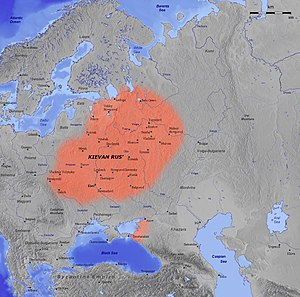Kiev Expedition (1018)
| Bolesław I's expedition to Kiev | |||||||
|---|---|---|---|---|---|---|---|
| Part of Kievan succession crisis, 1015–1019 | |||||||
 Kievan Rus in the 11th century, with adjoining regions |
|||||||
|
|||||||
| Belligerents | |||||||
| Kievan Rus' loyal to Sviatopolk allied with the Duchy of Poland and Kingdom of Hungary | Kievan Rus' loyal to Yaroslav the Wise | ||||||
| Commanders and leaders | |||||||
|
Bolesław I the Brave Sviatopolk I the Accursed |
Yaroslav I the Wise | ||||||
| Strength | |||||||
| uncertain: Germans (~300 knights), Hungarians (~500) and Pechenegs (~1,000 fighters), 2,000–5,000 Polish soldiers (est.) | unknown but estimated as similar to opposing size | ||||||
| Casualties and losses | |||||||
| unknown | unknown | ||||||
The intervention in the Kievan succession crisis of 1015–1019 by the Polish ruler Bolesław Chrobry was an episode in the struggle between Sviatopolk I Vladimirovich ("the Accursed") and his brother Yaroslav ("the Wise") for the rulership of Kiev and Kievan Rus'. It occurred when Sviatopolk's father-in-law Bolesław, ruler of Poland, intervened on Sviatopolk's behalf.
The intervention was initially successful as Bolesław defeated Yaroslav's armies, and temporarily secured the throne for Sviatopolk. But when Bolesław withdrew himself and his army from Kiev, Sviatopolk was unable to retain his position, being defeated by Yaroslav in the following year. Chronicles of the expedition include legendary accounts as well as factual history and have been subject to varied interpretations.
The ruler of Poland, Bolesław I, and the ruler of Kiev, Vladimir I, had previously fought over the Cherven Towns (in what was later called Red Ruthenia) in a conflict that ended favorably for Vladimir. Furthermore, Bolesław, who already had two wives, wanted to marry Predslava, one of Vladimir's daughters, in order to cement ties between the two families. Despite Bolesław's best efforts, the offer was refused and instead he had to accept a less prestigious connection to the house of Vladimir through the marriage of Bolesław's daughter to Vladimir's son, Sviatopolk. Between 1005 and 1013, Vladimir arranged Sviatopolk's marriage to Bolesław's daughter, whose name has not survived in sources.
It is possible that Vladimir decided that neither Sviatopolk nor Yaroslav would succeed to the Kievan throne after his death, as both Sviatopolk and Yaroslav revolted against their father. Vladimir perhaps intended that Sviatopolk would only receive the remote town of Turov (Turaŭ) after his death, and perhaps choosing his younger sons, Boris and Gleb, as successors despite Sviatopolk being older. Although Sviatopolk is known to have been older than Boris and Gleb, the exact birth order of Vladimir's sons is not known and Sviatopolk is alleged in some sources to have been a bastard. Perhaps unhappy by his rule being restricted to only a small appanage, Sviatopolk plotted to overthrow his father. Those theories, however, are based on very little evidence, and in the words of two historians, the origins of their "quarrels with their father are obscure". According to Thietmar of Merseburg, Bolesław encouraged Sviatopolk's revolt through his daughter and the latter's wife, though he does not specify the goal of the revolt. Sviatopolk's conspiracy was, in the event, thwarted by Vladimir, who called Sviatopolk and his entourage to Kiev and jailed them in 1013.
...
Wikipedia
